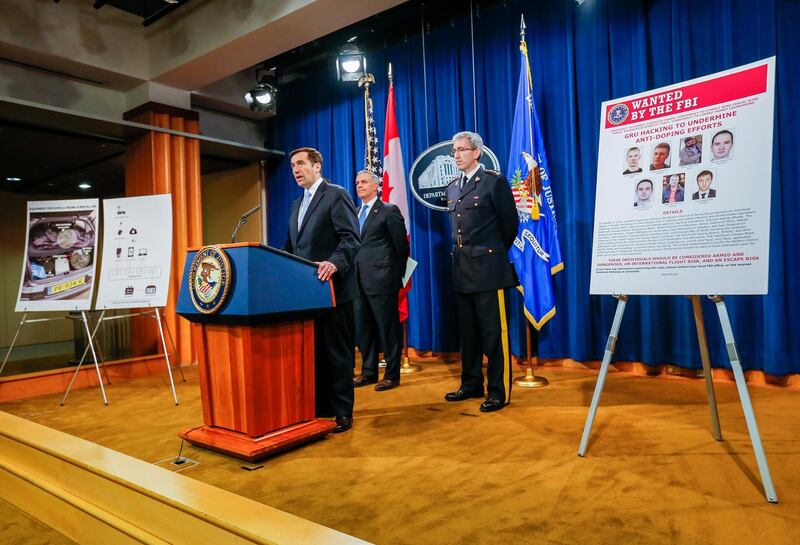The United States charged seven Russian intelligence officers with the hacking of anti-doping agencies and other organisations, in a global pushback against Russian hacking.
The Netherlands, the United Kingdom and Canada all announced they had been the subject of cyber warfare, which Nato's secretary general referred to as "reckless behaviour".
The US said Russian intelligence officers conspired to hack computers and steal data, in an attempt to delegitimise international anti-doping organisations and expose officials who revealed a Russian state-sponsored athlete doping program.
Earlier on Thursday, Dutch intelligence services revealed they thwarted a Russian cyber attack targeting the global chemical weapons watchdog in April and announced that they expelled four Russian agents.
The Russians set up a car full of electronic equipment in the car park of a hotel next to the Organisation for the Prohibition for Chemical Weapons in The Hague in a bid to hack its computer system, the Dutch government said.
At a presentation, Dutch Major General Onno Eichelsheim showed the antennae, laptops and other equipment the men intended to use to breach the OPCW's wifi network. He said the spies were caught red-handed and attempted to destroy some of their own equipment to conceal what they had been doing.
At the time, the chemical watchdog was working to identify the substance used to attack former Russian spy Sergei Skripal and his daughter.
"The Dutch government finds the involvement of these intelligence operatives extremely worrisome," Dutch Defence Minister Ank Bijleveld told a news conference.
"Normally we don't reveal this type of counter-intelligence operation."
_______________
Read more:
Sergei Skripal was a 'scumbag' and traitor to motherland Vladimir Putin says
Novichok suspect probably decorated by Putin
Skripal suspects: We were just visiting the cathedral
_______________
The United Kingdom's foreign minister, Jeremy Hunt, who were a partner in the investigation said this proves Russia was behind the attack in Salisbury.
"If anyone had questions in their mind about Russian military involvement in the Salisbury attacks this will put to rest those doubts," Mr Hunt told the BBC.
"Russian government needs to know that if they flout international law in this way there will be consequences, they will be exposed and people will see the Russian government for what they are - which is an organisation that is trying to foster instability throughout the world."
But Russia's embassy in the UK said that the accusations are crude disinformation and lacking in proof.
"This statement is irresponsible," the embassy said. "As is traditional, it is not backed by any proof and is another element in an anti-Russian campaign being conducted by the British government."
The Netherlands publicly identified the alleged Russian agents and said the operation was carried out by Russia's GRU military intelligence agency.
A laptop belonging to one of the four was linked to Brazil, Switzerland and Malaysia. The activities in Malaysia were related to the investigation into the 2014 shooting down of flight MH17 over Ukraine, Ms Bijleveld added.
Canada said on Thursday it too was targeted by Russian cyber attacks, citing breaches at its centre for ethics in sports and at the Montreal-based World Anti-doping Agency, after allies blamed Moscow for some of the biggest hacking plots of recent years.
"The government of Canada assesses with high confidence that the Russian military's intelligence arm, the GRU, was responsible" for these cyber attacks, the foreign ministry said in a statement.
Nato's secretary general – an organisation formed at the high of the cold war to provide collective security for the west – said Russia must stop its pattern of reckless behaviour, referencing its interference in election and disinformation campaigns.
"Russia must stop its reckless pattern of behaviour, including the use of force against its neighbours, attempted interference in election processes, and widespread disinformation campaigns," Jens Stoltenberg said.
"NATO will continue to strengthen its defence and deterrence to deal with hybrid threats, including in the cyber domain," the Nato chief said as defence ministers met to discuss new offensive cyber capabilities.






